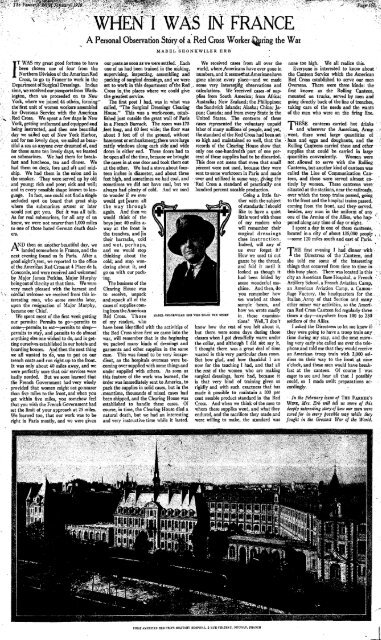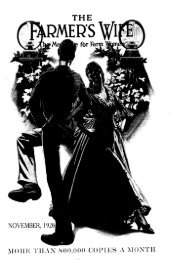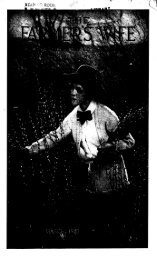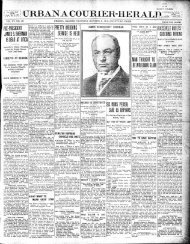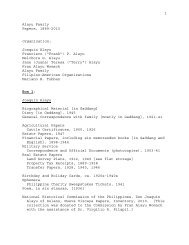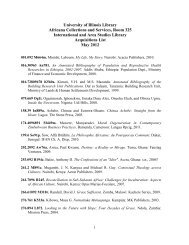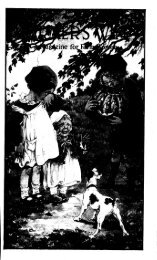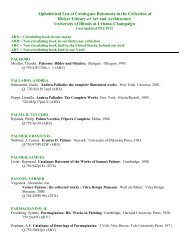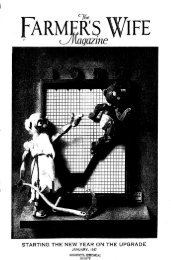A WOMAN'S FARM JOURNAL - University of Illinois
A WOMAN'S FARM JOURNAL - University of Illinois
A WOMAN'S FARM JOURNAL - University of Illinois
You also want an ePaper? Increase the reach of your titles
YUMPU automatically turns print PDFs into web optimized ePapers that Google loves.
WHEN 1 W^S IN FRANCE<br />
A Personal Observation Story <strong>of</strong> a Red Cross Worker ^uring the War<br />
MABEL SHONKWILER ERB<br />
WAS my great good fortune to have<br />
IT been chosen one <strong>of</strong> four from the<br />
Northern Division <strong>of</strong> the American Red<br />
Cross, to go to France1 our posts as soon as we were settled. Each<br />
one <strong>of</strong> us had been trained in the making,<br />
supervising, inspecting, assembling and<br />
to work in the packing <strong>of</strong> surgical dressings, and we were<br />
Department <strong>of</strong> Surgical Dressings. In due set to work in this department <strong>of</strong><br />
time, we received our passports from Washington,<br />
then we proceeded on to New<br />
York, where we joined 44 others, forming"<br />
the first unit <strong>of</strong> women workers assembled<br />
for Overseas Service with the American<br />
Red Cross. We spent a few days in New<br />
York, getting uniformed and equipped and<br />
being instructed, and then one beautiful<br />
day we sailed out <strong>of</strong> New York Harbor,<br />
and for ten lovely days, we sailed as beautiful<br />
a sea as anyone ever dreamed <strong>of</strong>, and<br />
for those same ten lovely days, we feasted<br />
on submarines. We had them for breakfast<br />
and luncheon, tea and dinner. We<br />
had them on deck, fore and aft and midship.<br />
We had them in the salon and in<br />
the smoker. They were served up by old<br />
and young; rich and poor;, sick and well;<br />
and in every possible shape known to language.<br />
In fact , one could not find a single<br />
secluded spot on board that great ship<br />
1 the Red<br />
Cross ur the places where we could give<br />
the greatest service.<br />
The first post I had, was in what was<br />
called, "The Surgical Dressings Clearing<br />
House." This was a work-room, established<br />
just outside the great wall <strong>of</strong> Paris<br />
in a French Barrack. The room was 175<br />
ieet long, and 60 feet wide; the floor was<br />
about 3 feet <strong>of</strong>f <strong>of</strong> the ground, without<br />
basement or embankment-there were large<br />
rattly windows along each side and wide<br />
doors in either end. These doors had to<br />
be open all <strong>of</strong> the time, because wehrought<br />
the cases in at one door and took them out<br />
at the other. We had a stove.about fourteen<br />
inches in diameter, and about three<br />
feet high, and sometimes we had coal, and<br />
sometimes we did not have coal, but we<br />
always had plenty <strong>of</strong> cold. And we used<br />
where the submarines sooner or later<br />
would not get you. But it was all talk.<br />
As for real submarines, for all any <strong>of</strong> us<br />
knew, we were not nearer than 1,000 miles<br />
to one <strong>of</strong> those hated German death dealers.<br />
AND then on another beautiful day, we<br />
** landed somewhere in France, and the<br />
next evening found us In Paris. After a<br />
good night's rest, we reported to the <strong>of</strong>fice<br />
<strong>of</strong> the American Red Cross at 4 Place de la<br />
Concorde, and were received and welcomed<br />
by Major James Perkins, Major Murphy<br />
beingout <strong>of</strong> thecity at that time. We were<br />
very much pleased with the earnest and<br />
cordial welcome we received from this interesting<br />
man, who some months later,<br />
upon the resignation <strong>of</strong> Major Murphy,<br />
became our Chief.<br />
We spent most <strong>of</strong> the first week getting<br />
our permits: Permits to go—permits to<br />
come-^-permits to eat—permits to sleep—<br />
permits to stay, and permits to do atmost<br />
anything else one wished to do, and in getting<br />
ourselves established in our hotels and<br />
boarding houses. And then the next thing<br />
we all wanted to .do, was to put on our<br />
trench coats arid run right up to the front.<br />
It was only about 40 miles away, and we<br />
were perfectly sure that our services were<br />
badly needed. But we soon learned that<br />
the French Government had very wisely<br />
provided that women might not go nearer<br />
than five miles to the front, and when you<br />
get within five miles, you somehow feel<br />
that you wish the French Government had<br />
set the limit <strong>of</strong> your approach at 25 miles.<br />
We learned too, that our work was to be<br />
right in Paris mostly, and we were given<br />
to wonder if we ever<br />
would get [warm all<br />
the way through<br />
again. And then we<br />
would think <strong>of</strong> the<br />
boys just 40 miles away<br />
at the front in<br />
the trenches, and [in<br />
their barracks, cold<br />
and wet, perhaps,<br />
and we would stop<br />
thinking about the<br />
cold; and stop wondering<br />
about it, and<br />
go on with our packing.<br />
The business <strong>of</strong> the<br />
Clearing House was<br />
to receive, unpack<br />
and repack all <strong>of</strong> the<br />
cases <strong>of</strong> supplies coming<br />
from the American<br />
Red Cross. Those UABEL SHONKWILER ERB WHO TELLS THE STORY<br />
<strong>of</strong> my readers, who<br />
have been identified with the activities <strong>of</strong><br />
the Red Cross since first we came into the<br />
war, will remember that in the beginning<br />
we packed many kinds <strong>of</strong> dressings and<br />
garments and other, supplies in the same<br />
case. This was found to be very inexpedient,<br />
as the hospitals overseas were becoming<br />
over supplied with some things and<br />
under supplied with others. As soon as<br />
this feature <strong>of</strong> the work was learned, the<br />
order was immediately sent to America, to<br />
pack the supplies in solid cases, but in the<br />
meantime, thousands <strong>of</strong> mixed cases had<br />
been shipped, and the Clearing House was<br />
established to handle these cases. Of<br />
course, in time, the Clearing House died a<br />
natural death, but we had an interesting<br />
and very instructive time while it lasted.<br />
We received cases from all over the<br />
world, where Americans have ever gone in<br />
numbers, and it seemsthat Americans have<br />
gone almost every places—and we made<br />
some very interesting observations and<br />
calculations. We received cases <strong>of</strong> supplies<br />
from South America; from Africa;<br />
Australia; New Zealand; the Philippines;<br />
the Sandwich Islands; Alaska; China; Japan;<br />
Canada; and from every State in the<br />
United States. T"he contents <strong>of</strong> these<br />
cases represented the voluntary unpaid<br />
labor <strong>of</strong> many millions <strong>of</strong> people, and, yet,<br />
the standard <strong>of</strong> the Red Gross had been set<br />
so high and maintained so well, that the<br />
records <strong>of</strong> the Clearing House show that<br />
only one one-hundredth ; part <strong>of</strong> one percent<br />
<strong>of</strong> these supplies had to be discarded.<br />
This does not mean that even that small<br />
percent were not used, because they were<br />
sent to some workroom in Paris and made<br />
over and utilized m some way, giving the<br />
Red Cross a standard <strong>of</strong> practically one<br />
hundred percent useable production.<br />
Going a little farther<br />
with the subject<br />
<strong>of</strong> standards: I should<br />
like to have a quiet<br />
little word with those<br />
<strong>of</strong> my readers who<br />
will remember their<br />
surgical dressings<br />
class instruction.<br />
Indeed, will any <strong>of</strong><br />
us ever forget it?<br />
How we used to cut<br />
gauze by the thread,<br />
and fold it until it<br />
looked as though it<br />
had been folded by<br />
some wonderful machine.<br />
And then, do<br />
you remember how<br />
we worked at those<br />
sample boxes, and<br />
FIRST AMERICAN RED CROSS MILITA RY HOSPITAL, b RUE CHATEAU. NEUtLLY, FRANCE<br />
none too high. We all realize this.<br />
Everyone is interested to know about<br />
the Canteen Service which the American<br />
Red Cross established to serve our men<br />
Overseas. There were three kinds: the<br />
first known as the Rolling Canteen,<br />
mounted on trucks, served by men and<br />
going directly back <strong>of</strong> the line <strong>of</strong> trenches,<br />
taking care <strong>of</strong> the needs and the wants<br />
<strong>of</strong> the men who were on the firing line.<br />
THESE canteens carried hot drinks<br />
and wherever the American, Armywent,<br />
there went large quantities <strong>of</strong><br />
ham and eggs and doughnuts, and the<br />
Rolling Canteens carried these and other<br />
supplies that could be carried in large<br />
quantities conveniently. Women were<br />
not. allowed to serve with the Rolling<br />
Canteens, but another kind <strong>of</strong> canteen was<br />
called the Line <strong>of</strong> Communication Canteen,<br />
and these were served almost entirely<br />
by women. These canteens were<br />
situated at the stations, near the railroads,<br />
over which the troop trains passed, going<br />
to the front and the hospital trains passed,<br />
coming from the front, and they- served,<br />
besides, any man in the uniforrri <strong>of</strong> any<br />
one <strong>of</strong> the Armies <strong>of</strong> the Allies, who happened<br />
along any time <strong>of</strong> day or night. '<br />
I spent a day in one <strong>of</strong> these canteens,<br />
located in a city <strong>of</strong> about 135,000 people<br />
—some 120 miles south and east <strong>of</strong> Paris.<br />
THE<br />
first evening I had dinner with<br />
the Directress <strong>of</strong> the '.Canteen, and<br />
she told me some <strong>of</strong> the interesting<br />
things that occurred from time to time in<br />
this busy place! There was located in this<br />
city an American Base Hospital, a French<br />
Artillery School, a French Aviation Camp,<br />
an American Aviation Camp, a Camouflage<br />
Factory, the headquarters for the<br />
Italian Army <strong>of</strong> that Section and many<br />
other minor war activities, so the Ameri-<br />
how we wrote madly can Red Cross Canteen fed regularly three<br />
in . those examina- times a day—anywhere from 100 to 250<br />
tions? Well,!<br />
don't soldiers <strong>of</strong> the Allies.<br />
know how the rest <strong>of</strong> you felt about it, I asked the Directress to let me know if<br />
but there, were some days during those they were going to have a troop train any<br />
classes when I got dreadfully warm under time during my stay, and the next.morn-<br />
the collar, and although I did not say it , ing very early she called me over the tele-<br />
I thought there was a great deal <strong>of</strong> time phoneand told me that they would receive<br />
wasted in this very particular class room. an American troop train with 2,000 sol-<br />
But how glad, and how thankful I am diers on their way to the front at nine<br />
now for the teaching I had, and that all o'clock, and these men would have break-<br />
the rest <strong>of</strong> the women who are making fast at the canteen. Of course I was<br />
surgical dressings, have had, because it eager to see and hear all that I possibly<br />
is that very kind <strong>of</strong> training given so could, so I made swift preparations ac-<br />
rigidly and with such exactness thai has cordingly.<br />
made it possible to maintain a 100 per<br />
cent useable product standard in the Red In the February issue <strong>of</strong> THE <strong>FARM</strong>ER'S<br />
Cross. And when we think <strong>of</strong> the men to WIFE, Mrs. Erb will tell us more <strong>of</strong> this<br />
whom these supplies went, and what they deeply interesting story <strong>of</strong> how our men were<br />
endured, and the sacrifices they made and cared for in every possible way while they<br />
were willing to make, the standard was fought in tlie Greatest War <strong>of</strong> the World.


